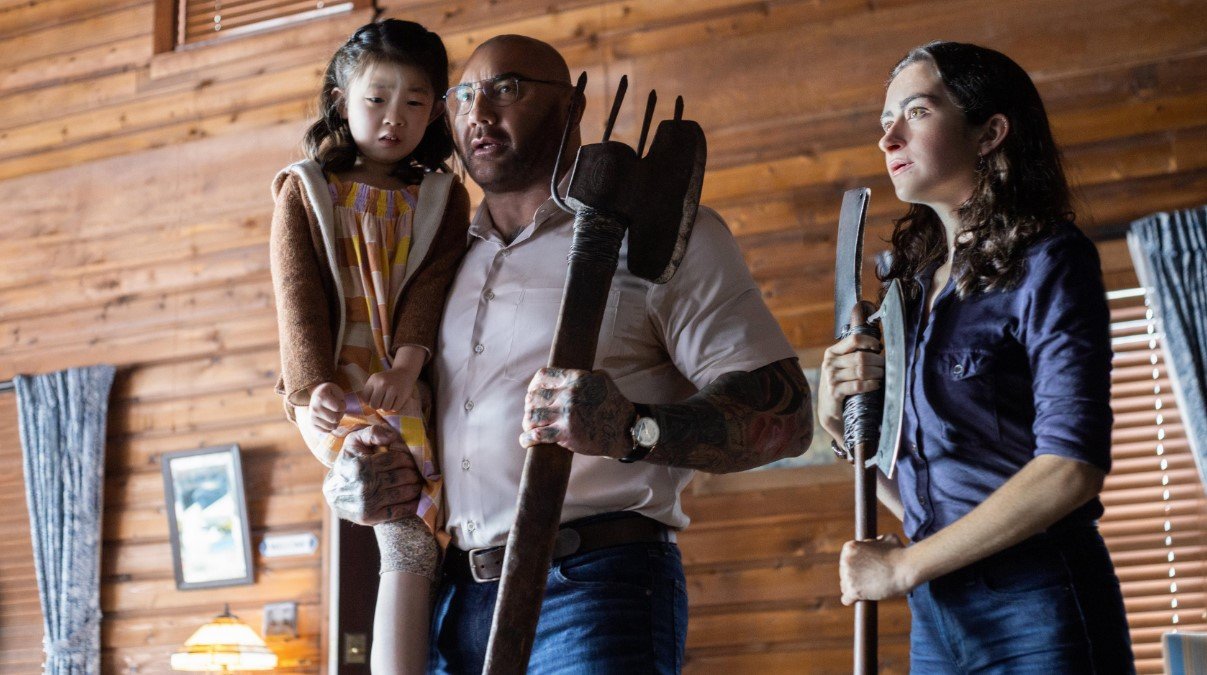It's a bad joke and a bum rap that M. Night Shyamalan is often confused for simply a merchant of cheap twists. Still, there's no denying that a desire to blow minds, to leave audiences reeling from a last-minute reversal, remains baked into his artistry, several decades removed from The Sixth Sense, the movie that made his career and his reputation as a relentless rug-puller.
Knock at the Cabin, Shyamalan's latest chance to stun audiences, has a slightly different alchemy. In this claustrophobic high-concept thriller, the possibility of a big climatic reveal isn't lurking somewhere in the background like a twist waiting to happen, implied by the name on the byline. No, here it's an open threat for audiences and characters alike—one scary possibility of only two on the horizon. In that sense, Shyamalan has privileged suspense over surprise this time, wresting control, Split style, from his inner Rod Serling and handing it over to his inner Alfred Hitchcock.
There is, of course, some overlap between the two. Both mid-century hosts of TV anthologies might appreciate the economy of Knock at the Cabin, which wastes no time setting up its pressure-cooker scenario. It's in the very opening scene that 8-year-old Wen (Kristen Cui), blissfully catching grasshoppers on vacation, is approached by Leonard (Dave Bautista), a hulking stranger who emerges from the surrounding woods. Leonard is friendly and seemingly non-threatening, but there's something ominous about the conversation he strikes up with the little girl—especially once three more strangers step into view, each brandishing a homemade weapon.
Within moments, Wen has raced inside the cabin her adoptive fathers, Eric (Jonathan Groff) and Andrew (Ben Aldridge), have rented. On the other side of the door, Leonard and his posse gather, gently but firmly demanding entry. What do they want? It's not, we quickly learn, a matter of homophobia. No, the four have come with a prophecy of doom on their breath. They have all experienced apocalyptic visions—a holy calling that's led them to this specific family, and to the cruel sacrifice they'll now demand of Eric, Andrew, and Wen. The whole world is at stake, they insist.
Are these intruders dangerous zealots caught in a shared delusion? Or are they genuine prophets? That question loomed eternally, disturbingly over Paul Tremblay's 2018 novel The Cabin at the End of the World. Shyamalan, who's adapted the book with Steve Desmond and Michael Sherman, remains largely faithful to the blueprint of its brisk, scary narrative, at least for a good long while. This extends to the use of flashbacks from the novel, which provide texture to the central relationship between Andrew and Eric.
Shyamalan embraces the dramatic and spacial restrictions of the story, which unfolds almost entirely within the eponymous cabin, playing out as a theatrical series of volatile exchanges. As always, he blocks his action with eccentric flair—ballasting the besieged couple against the blurred image of Bautista's massive head on the other side of the frame, tracking nervously around the edges of the cabin as the strangers appear and disappear in windows during their initial home invasion. His exaggerated style of limited or obstructed vantages is a good fit for a story about trying to see reality just beyond perception. Tremblay's novel also brings out the director's more classical tastes, exemplified by Herdís Stefánsdóttir's old-school suspense score and is established from the get-go via a retro Universal vanity card and the lost art of the opening credits sequence.
Part of the spooky kick of Knock at the Cabin is that there's something rational about these ostensible villains. They come across as ordinary people, not lunatics, which gives their talk of impending global calamity the chilling ring of logic. Bautista, especially, is ideally cast as the mournful Leonard, always coloring his mania with anguished empathy. The danger his cult of believers poses, at a certain point, is that they might really convince this family that they're speaking the unspeakable truth. Knock at the Cabin is a thriller that hinges on whether madness is catching, or whether the true insanity would be to deny the signs appearing before you.
In that respect, Shyamalan has tapped right into the paranoia of our age. He's made a single-location potboiler that echoes the rapid proliferation of crackpot conspiracy theories and the powerful urge to doom scroll. Politically, environmentally, virally, the world often does seem on the verge of apocalypse. Knock at the Cabin even weaves televised broadcasts of bad news into the architecture of its mystery, allowing Shyamalan to stage a horribly believable disaster movie in miniature. One scene of summertime bliss gone wrong recalls the big birthday-party scare of Signs. To go further, this might be the closest the filmmaker has come to recapturing that movie's contained comingling of terror, faith, and domestic duress.
To say much more would risk spoiling things—an act of heretical hostility in Shyamalan country, where something major is always awaiting around the final bend, whether it qualifies as a twist or not.
Knock at the Cabin is in theaters now.

